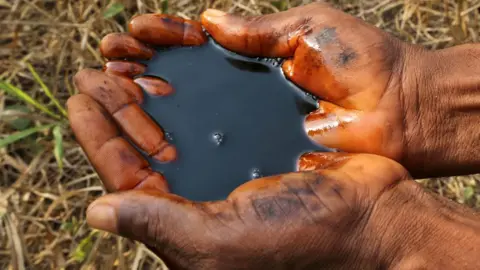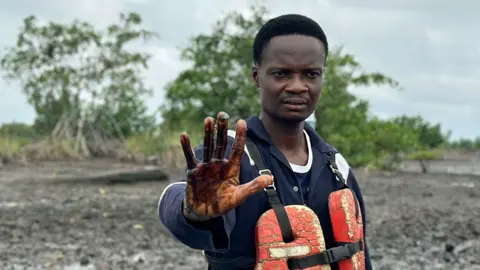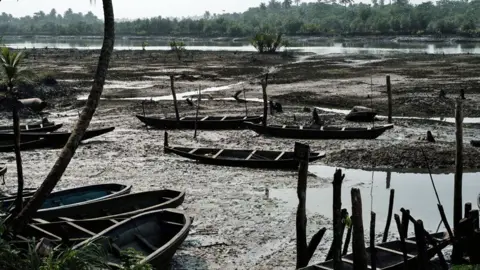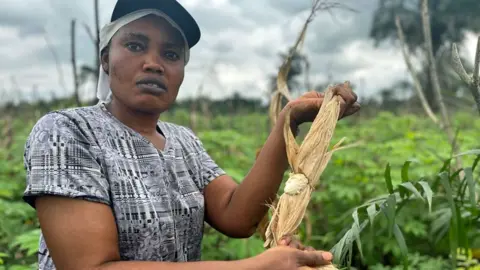Physical Address
304 North Cardinal St.
Dorchester Center, MA 02124
Physical Address
304 North Cardinal St.
Dorchester Center, MA 02124

BBC News, Ogoniland
 Getty Images
Getty ImagesThe BBC investigation stated that Energy Giant Shell has ignored repeated warnings that the contradictory cleaning operations of Nigeria’s southern oil contamination areas are disturbed by problems and corruption.
The London multinational headquarters, along with the Nigerian government, has repeatedly stated that Ogoniland’s oil -polluted site cleaning work, which began about eight years ago, was going well.
However, the BBC has discovered evidence that for several years, they have been warned several times that the government set up by the government and funded by various oil companies has a $ 1 billion (£ 805 million) of issues.
One of the close observers described the cleaning project as “Con” and “scam”, which wasted money and continued to live in the Niger Delta region with the devastating effects the severity of their position.
Shell told the BBC: “Niger Delta’s operating environment remains challenging thanks to illegal activities, such as a huge scale of oil theft.
“When spills from our facilities, we clean and remedy it, regardless of the reason. If it is an operational spill, we will compensate for people and communities.”
The statements are expected to begin on Thursday in the London Supreme Court, where the two Ogoniland lawyers are about 50,000 inhabitants –
According to communities, the spills were left without clean water, they could not farm and fish, and posed a serious risk to public health.
The Shell, which sies its wealth in the West -Fricika country to focus on offshore drills and land gases, indicated that it would protect the claims.
This denies infringements and says that the spills in the area are caused by sabotage, theft and illegal refinement, which the company does not answer.
The BBC visited the affected areas of Niger Delta, where Shell, the country’s largest private oil and gas company, discovered the existence of crude oil 68 years ago.
According to the UN, at least 13 million barrels of barrels – or 1.5 million tonnes – have been spilled since 1958 at least 7,000 events in the Niger Delta region.
The spills left many families worried about their health and their livelihood.
37-year-old Grace Audi’s partner and lives at the age of two in Ogare, where at least 40 oil pollution occurred from Shell’s infrastructure, says Leigh Day, the UK law in this case.
His family and neighbor only accesses a contaminated borehole and forced them to buy clean water for drinking, cooking, washing and once a day at 4,500 Nigerian Naira (3, £ 2.40) – one – the area where the average Daily wages are less than $ 8.
This is a familiar story many in Ogoniland.
Paulina Agbekpekpe told the BBC that lush vegetation once surrounded the Bodo community blooming mangrovei -which is not in court on Thursday. He said that rivers and lakes were destroyed with all kinds of animals and fish, especially Periwinkle.
“The place was greener, not only Mangrove, but also paw trees, palm trees and much more. But during the spills, the destruction was polluted everywhere,” said the 50-year-old mother.
His family has survived fishing since generations until 10 years ago was a devastating spill.
“The majority of children – from drinking water – have illnesses. Many have died. I lost eight children. My husband is sick.
“Because our livelihoods have been taken, the people in the bodies are hungry and suffer.”
In 2011, the UN Environment Program (UNEP) published a large study on the impact of pollution on the oil-rich area.
He found that members of a community of Ogoniland were drinking water polluted with known carcinogen over the World Health Organization (WHO) guidance more than 900 times. The same chemical, benzene, was detected in all their air samples.
He also stated that Shell’s Nigerian subsidiary, Nigerian Shell Petroleum Development Company (SPDC), which allegedly remedied, continued to be contaminated and did not understand the regulatory requirements.
The report came to the conclusion that comprehensive cleaning of the area It would take 25-30 years – and this has led to the formation of hydrocarbon contamination project (Hyprep).
This was initially created by the Nigerian government in 2012, but did not start cleaning – until a new government reopened in December 2016.
Hyprep was partially funded by oil companies, including state-owned Nigerian National Petroleum Company (NNPC) and Shell, $ 350 million.

However, the BBC saw internal documents that suggest that Shell and Nigerian government representatives have repeatedly warned the agency’s alleged fraudulent practice.
A person who was aware of the project talked to the BBC about their concerns – and asked him to remain anonymous about the fear of retaliation.
“It is well known that it is actually a fraud we do what we do. Most is to deceive the Ogon people,” the announcer said.
“It is a perpetual that more money can be put into the pot and they are in the pocket of politicians and other people.”
The statements about the failures of Hyprep are as follows:
The minutes of the 2023 meeting, attended by representatives of the Shell Nigerian subsidiary, UNEP and Hyprep, have been shown that “incompetent” entrepreneurs are again committed “and that” it should not be allowed to further deteriorate the environment. “.
The BBC showed a special leaked report seen from the same year that laboratory results were “regularly reported by differences”.
In 2022, the UN wrote to the Nigeria Ministry of Environment, warning that if nothing changes, the “extremely bad standards” of cleaning would continue.
The BBC asked Hyprep and the Nigerian government to comment on the statements but did not receive an answer.
However, our study revealed evidence that Shell was aware of the problems.
At a meeting with the Nigerian High Commissioner in January last year, the report of which was held under the Information Freedom Act, SHEll’s representatives recognized the “institutional challenges” of the cleaning agency and the “chances of denying the future”.
Shell told the BBC: “Hyprep is an agency established and supervised by a Nigerian federal government, the Governing Council, largely from prime ministers and government officials, and five representatives of communities and non -governmental organizations and one SHELL representative.”
 AFP
AFPThis is not the only remediation project in Ogoniland that has been supposed to be spoiled.
In 2015, SHELL agreed to an £ 55 million for cleaning after two catastrophic spills were launched in 2008 from Bodo’s territorial infrastructure.
According to the company, the Cleaning by Bodo Mediation Initiative (BMI) is aimed at 98% of the oil companies, including the Giant and the Nigerian regulators.
However, the BBC visited the places in the area and found it raw oil from the soil and floated in the waters.
Shell and BMI insist in the region of possible occurrence of oil pollution, which, due to theft, is called “olive -bunkering” in the industry.
“There is a plan to call back entrepreneurs to clean these areas for specification, the standard,” said Boniface Dumpe, BMI director at the BBC.
“It is the responsibility of all stakeholders, Shell, yes, to ensure their facilities, to ensure that re -oiling is not from their facilities.
“But for the cleaned areas. I believe that some responsibility for the community is also to ensure that some illegal activities do not cause re -contamination.”
According to Shell, he takes active measures to prevent oil pollution caused by oil consumption.
The company said: “We take respectful steps to prevent this activity and prevent the spills it causes, including air surveillance, removing illegal relationships by piping and building steel cages to protect well heads.”
The alleged failures of oil cleaning occur when Shell is preparing to sell its Nigerian subsidiary, SPDC, Renaissance Africa, a consortium of local and international companies.

Some Ogoniland locals accused the oil giant of “escaping” the proper cleaning of the earth and the waters, which is allegedly contaminated.
They also fear that the shell can continue to profit from the region if in the future it is simply a trading of oil from the region.
“The operation of any oil operator that takes over the relevant pipelines will have a huge impact on their daily lives,” said Joe Piton, a lawyer at Leigh Day, to the BBC.
“There is incredibly little detail about what these transactions lead to.
“It is not clear how the Renaissance (Africa) will move on with the move. At least at Shell we have a tool to settle them.”
Mineral products, such as oil and gas, make up 90% of Nigerian exports, most of which come from the Niger Delta region.
The locals whose main source of livelihood was agriculture and fishing told the BBC that since the oil discovery, or some called “black gold”, their homes had been pumped on profit – by oil thieves by large oil companies, oil by thieves. and by corrupt politicians.
It is said that they did not see any benefits, only suffering – such as the patience Ogboe, who blame recent oil pollution for his failed plants.
“Earlier, if I harvest it, I can eat some with my family, and even sell some … but in recent years I haven’t been able to get anything. It is very bad”-42 year old BBC.
 Getty Images/BBC
Getty Images/BBC